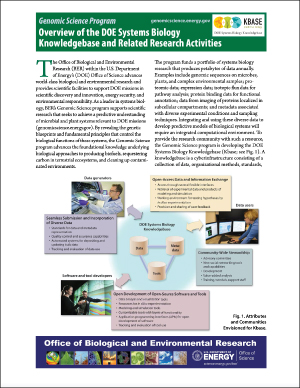Overview of the DOE Systems Biology Knowledgebase and Related Research Activities
- Print Publication: November 2010
- Download: PDF
Summary
The Office of Biological and Environmental Research (BER) within the U.S. Department of Energy’s (DOE) Office of Science advances world-class biological and environmental research and provides scientific facilities to support DOE missions in scientific discovery and innovation, energy security, and environmental responsibility. As a leader in systems biology, BER’s Genomic Science program supports scientific research that seeks to achieve a predictive understanding of microbial and plant systems relevant to DOE missions. By revealing the genetic blueprints and fundamental principles that control the biological functions of these systems, the Genomic Science program advances the foundational knowledge underlying biological approaches to producing biofuels, sequestering carbon in terrestrial ecosystems, and cleaning up contaminated environments.
The program funds a portfolio of systems biology research that produces petabytes of data annually. Examples include genomic sequences on microbes, plants, and complex environmental samples; proteomic data; expression data; isotopic flux data for pathway analysis; protein binding data for functional annotation; data from imaging of proteins localized in subcellular compartments; and metadata associated with diverse experimental conditions and sampling techniques. Integrating and using these diverse data to develop predictive models of biological systems will require an integrated computational environment. To provide the research community with such a resource, the Genomic Science program is developing the DOE Systems Biology Knowledgebase. A knowledgebase is a cyberinfrastructure consisting of a collection of data, organizational methods, standards, analysis tools, and interfaces representing a dynamic body of knowledge.
The fully functional Kbase is a cyberinfrastructure for systems biology information and data that supports open community science. It not only will include data storage, retrieval, integration, and management, but also will enable new knowledge acquisition through free and open access to data, analysis tools, resources for modeling and simulation, and information for the research community. Kbase differs from current informatics efforts by bringing together research products from many different projects and laboratories to create a comprehensive computational environment focused on DOE scientific objectives in microbial, plant, and metacommunity (complex communities of organisms) research. By democratizing access to data and computational resources, Kbase will enable any laboratory or project, regardless of size, to participate in a transformative community-wide effort for advancing systems biology and accelerating the pace toward predictive biology.
This document provides an overview of the DOE Systems Biology Knowledgebase, a collaborative effort between four national laboratories and many research universities. It also describes Kbase development efforts carried out during the past year and summarizes current research, including:
- Knowledgebase R&D project. Completed in September 2010, this effort included five pilot projects that laid the foundation for Kbase. Summaries of these early successes begin.
- University-led projects to develop computational biology and bioinformatic methods enabling Kbase. Descriptions of the 11 funded projects awarded in 2010 begin.
Together, these activities—along with existing user-community data and resources—underpin development of the KBase program.

